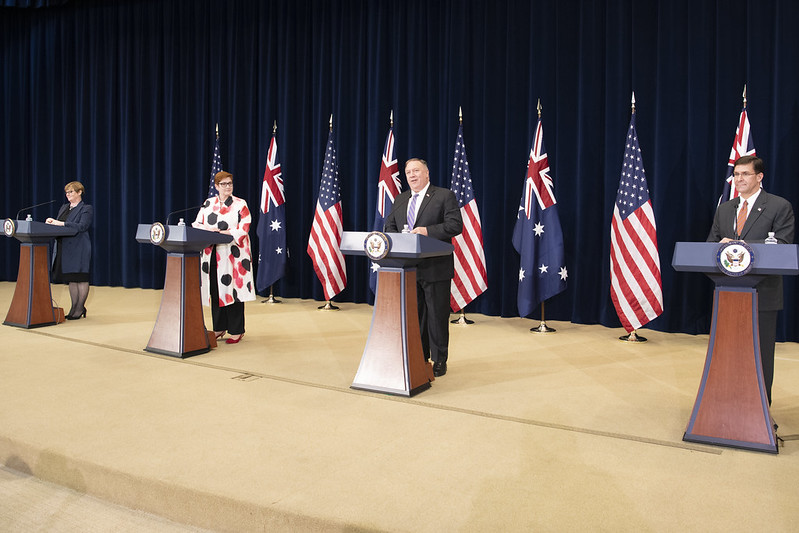AUSMIN 2020: Social distancing while setting the agenda
Posted By Michael Shoebridge on July 30, 2020 @ 14:22

Australia’s Foreign Minister Marise Payne and Defence Minister Linda Reynolds pulled off a magic trick at this week’s AUSMIN meeting. Australian decisions and directions—on military power, digital technology, misinformation and military supply chains—set the scene for the meeting and the agenda. And it was all about dealing with an assertive, coercive Chinese state while in the midst of a pandemic. But the public discussion [1] of China came from the mouth of US Secretary of State Mike Pompeo.
This allowed Australia to work with the US on the substance of how to handle Beijing while not being identified with the particular rhetoric and tone of the US administration’s messaging. By doing this, Payne and Reynolds role-modelled how other US partners—whether in Europe or the Indo-Pacific—want to work with the US. That’s good news for Australia’s ability to work in the alliance framework and with a range of other regional and international partners who are increasingly seeing common interests in working together in light of the People’s Republic of China’s coercive incarnation under Xi Jinping.
Compared with AUSMINs in recent [2] years, the 2020 event was refreshingly practical and active. The fact that there’s an agreed assessment in Washington and Canberra of the trajectory of China under Xi no doubt helps, but the driver now is the shared sense of urgency in doing practical things [3] together as a result. This fits with the Australian government’s recent defence strategic update [4], which moved away from the 2016 defence white paper’s focus on a distant force turning up during the 2030s and 2040s and instead focused on improving the Australian military’s ability to engage in sustained combat and its power to deter others from seeking military advantage in our near region.
This comes from the shared assessment that the time to begin to shift the PRC’s trajectory, whether in the South China Sea or in the broader Indo-Pacific, is not 10 years from now, it’s right now. So things that have been talked about for years will now actually happen. Fuel availability and security from Australia’s north will be addressed by new strategic fuel storage in Darwin, paid for by the US and supplied commercially. That’s a result of years of analysis about shortfalls and vulnerability in this critical input to military operations, including from my ASPI colleagues John Coyne and Tony McCormack [5].
Similarly, long discussions on providing alternative supplies of critical minerals for defence purposes have now led to action: the Pentagon is funding the Australian company Lynas to do engineering and feasibility work for a facility in the US for extracting heavy rare earth elements, no doubt using rare earths supplied from Australia.
On how our militaries will work together—and use the fuel stored in Darwin and elsewhere—the US and Australia agreed on a classified statement setting out principles and priorities for cooperation in the Indo-Pacific, with the likely goal of deterring Chinese aggression and supporting the security of regional partners. At least two of the strategic priorities here are clear: deterring further Chinese control of the South China Sea and preventing intimidation and use of force around Taiwan from creating the conditions for any attempt by Beijing to forcibly bring Taiwan into the PRC’s control.
The meeting was also a welcome recognition by the alliance partners of the fundamental power of partnerships—notably with India and Japan through the Quad, with ASEAN and through the East Asia Summit. Far from ‘militarising foreign policy’ as critics have worried, the outcomes show the US and Australia working together to use military power and deterrence to provide a platform for diplomacy. Aside from the roles of these multilateral forums and groupings, our nations’ foreign policy agencies—the Department of Foreign Affairs and Trade and the State Department—will lead a new joint initiative to counter misinformation, enabled by intelligence and security agencies.
That’s going to be a busy area, given the prolific propaganda machine that is the PRC and the need to stop Beijing’s narratives form being lazily picked up and used in commentary and analysis in our own nations and around the world—whether it’s obscuring the pandemic’s origins or pretending that Beijing’s belligerence is actually peaceful win–win mutual benefit behaviour. There’s an immediate need to keep the focus on Beijing’s [6] intrusive and coercive actions and not let debates be diverted by its attempts to portray those who oppose or criticise the PRC as the causes of tension.
Of course, there’s still work to be done. Signals of closer industrial cooperation and implementation of the US decision to consider Australia as part of its defence industrial base are great. This is yet to move from concept to action, though. AUSMIN 2020 has no doubt added momentum here, but we have yet to see concrete plans that remove vulnerabilities in defence supply chains beyond fuel, particularly around production and resupply of missiles and munitions, along with the urgent need to accelerate getting hypersonic weapons and autonomous undersea systems into the hands of our militaries. That’s going to take more than this trip to Washington, but it’s an essential element in how the Australia–US alliance needs to work to advance both nations’ security and prosperity in the next few years.
Article printed from The Strategist: https://www.aspistrategist.org.au
URL to article: https://www.aspistrategist.org.au/ausmin-2020-social-distancing-while-setting-the-agenda/
URLs in this post:
[1] public discussion: https://www.state.gov/secretary-michael-r-pompeo-at-a-press-availability-with-secretary-of-defense-mark-esper-australian-foreign-minister-marise-payne-and-australian-defence-minister-linda-reynolds/
[2] recent: https://www.minister.defence.gov.au/minister/marise-payne/statements/joint-statement-ausmin-2017
[3] practical things: https://www.aspistrategist.org.au/us-australia-talks-relationship-returns-to-normal/
[4] defence strategic update: https://www.defence.gov.au/strategicupdate-2020/
[5] ASPI colleagues John Coyne and Tony McCormack: https://www.aspistrategist.org.au/tag/fuel-security/
[6] focus on Beijing’s: https://www.aspistrategist.org.au/diagnosing-the-problem-its-about-china-and-its-more-than-the-us-china-show/
Click here to print.